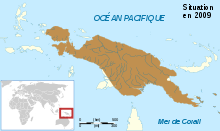Hylophorbus rufescens
Hylophorbus rufescens is a species of frog in the family Microhylidae. It is endemic to New Guinea and some nearby islands, and occurs in both West Papua (Indonesia) and Papua New Guinea. Common name red Mawatta frog has been coined for it.[2]
| Hylophorbus rufescens | |
|---|---|
| Scientific classification | |
| Kingdom: | Animalia |
| Phylum: | Chordata |
| Class: | Amphibia |
| Order: | Anura |
| Family: | Microhylidae |
| Genus: | Hylophorbus |
| Species: | H. rufescens |
| Binomial name | |
| Hylophorbus rufescens Macleay, 1878 | |
 | |
| Synonyms[2] | |
| |
Three subspecies are recognized:[2]
- Hylophorbus rufescens rufescens Macleay, 1878
- Hylophorbus rufescens extimus Zweifel, 1972
- Hylophorbus rufescens myopicus Zweifel, 1972
However, it is a species complex that is not yet fully resolved.[1][2] Because of continual uncertainties with delimitation of this species, its range cannot be determined accurately.[1]
The Fergusson Island form, which may be distinct from H. rufescens proper, is infected by the nematode Moaciria moraveci.[3]
Hylophorbus rufescens is a terrestrial frog living on the forest floor in tropical rainforests at elevations up to 3,570 m (11,710 ft) above sea level. It is nocturnal. It is a very common species.[1]
References
- Richards, S. & Günther, R. (2004). "Hylophorbus rufescens". IUCN Red List of Threatened Species. 2004: e.T57827A11690517. doi:10.2305/IUCN.UK.2004.RLTS.T57827A11690517.en.
- Frost, Darrel R. (2018). "Hylophorbus rufescens Macleay, 1878". Amphibian Species of the World: an Online Reference. Version 6.0. American Museum of Natural History. Retrieved 26 March 2018.
- Bursey, Charles; Goldberg, Stephen & Kraus, Fred (2007). "A new species of Moaciria (Nematoda, Heterakidae) and other helminths in the red Mawatta frog, Hylophorbus cf. rufescens (Anura, Microhylidae) from Papua New Guinea". Acta Parasitologica. 52 (3): 233–237. doi:10.2478/s11686-007-0027-y.
